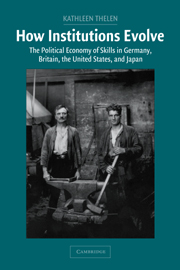 How Institutions Evolve
How Institutions Evolve Published online by Cambridge University Press: 05 September 2012
The past two decades have witnessed an enormous outpouring of literature on the putative effects of “globalization” on the political economies of the advanced industrial countries. A good deal of this literature was inspired by early, sometimes rather breathless predictions of a trend toward convergence in the institutional arrangements governing these political economies. Such convergence, it was argued by some, would result from the pressures imposed by footloose firms engaged in “regime shopping” which would in turn drive competitive deregulation among the advanced countries (see, for example, Kapstein 1996; Kurzer 1993). These prospects were especially worrisome to students of Europe's “corporatist” political economies, which had long been admired as models of economic efficiency and social equality.
In the meantime, however, a good deal of evidence has accumulated that calls into question arguments about a convergence among the institutional arrangements that characterize different political economies (Berger and Dore 1996; Brown, Green, and Lauder 2001; Ferner and Hyman 1998; Garrett 1998; Iversen, Pontusson, and Soskice 2000; Kitschelt et al. 1999; Streeck and Yamamura 2002; Vogel 2001; Wallerstein and Golden 1997). Although there are certainly changes afoot in all countries, a number of scholars have pointed to systematic and apparently enduring differences in the organization of capitalism across the advanced industrial countries. Different authors characterize these differences each in his or her own way, but the consensus that has emerged is truly striking.
To save this book to your Kindle, first ensure [email protected] is added to your Approved Personal Document E-mail List under your Personal Document Settings on the Manage Your Content and Devices page of your Amazon account. Then enter the ‘name’ part of your Kindle email address below. Find out more about saving to your Kindle.
Note you can select to save to either the @free.kindle.com or @kindle.com variations. ‘@free.kindle.com’ emails are free but can only be saved to your device when it is connected to wi-fi. ‘@kindle.com’ emails can be delivered even when you are not connected to wi-fi, but note that service fees apply.
Find out more about the Kindle Personal Document Service.
To save content items to your account, please confirm that you agree to abide by our usage policies. If this is the first time you use this feature, you will be asked to authorise Cambridge Core to connect with your account. Find out more about saving content to Dropbox.
To save content items to your account, please confirm that you agree to abide by our usage policies. If this is the first time you use this feature, you will be asked to authorise Cambridge Core to connect with your account. Find out more about saving content to Google Drive.